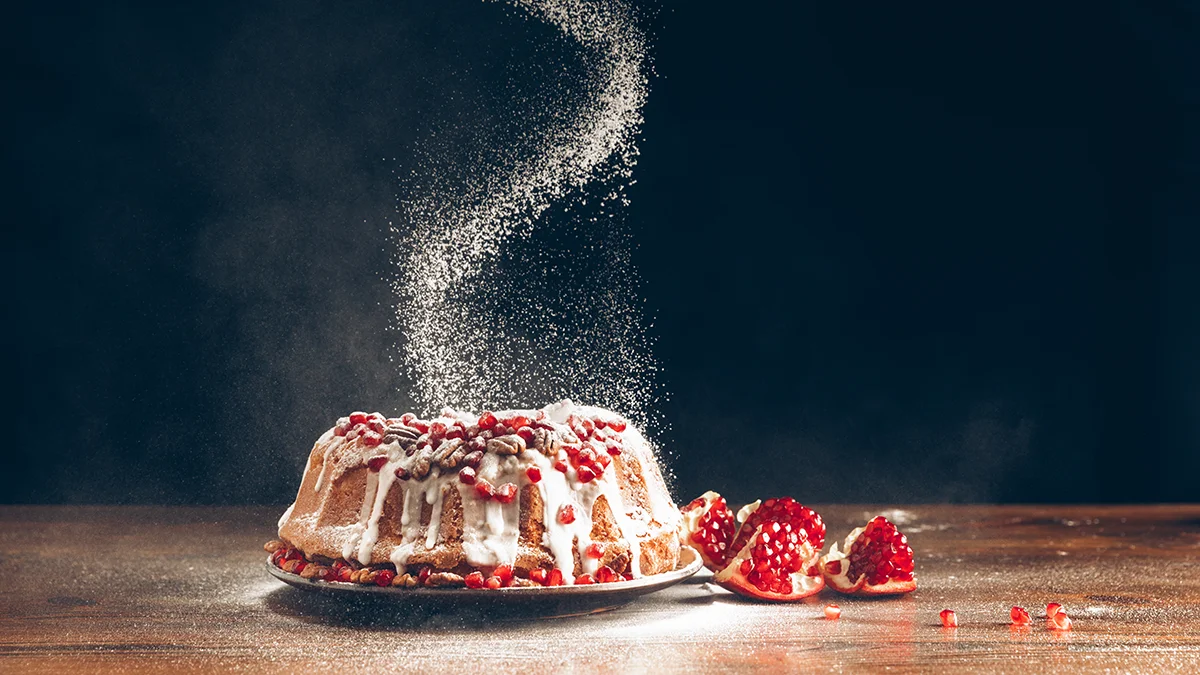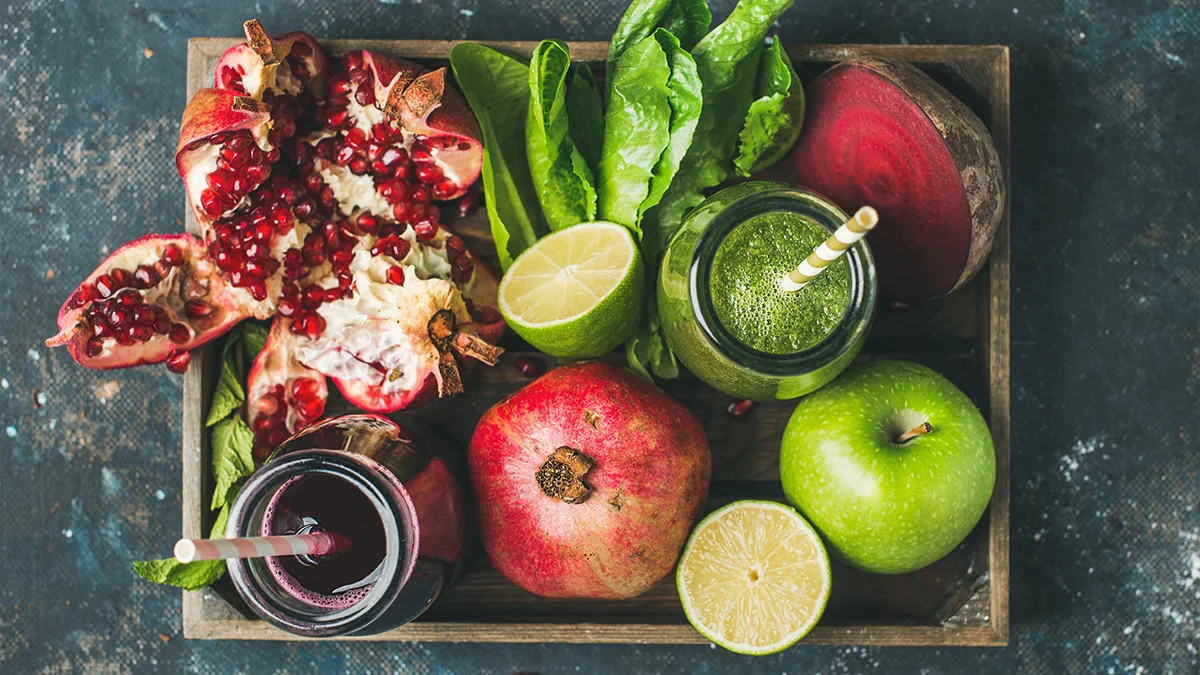4 min read
Skin Glycation: The Sour Side Of Sugar

You wake up, a bit groggy and kind of bloated, but happy. The holiday season was a blast, with delicious sweet treats, cakes, cookies, and clinking glasses at every corner. If the room were circular, the sweet corner would have still found you. You acknowledge these extra few pounds you've found and choose not to step on the scale, embracing blissful ignorance of their exact number.
But as the face in the mirror stares at you, something is off. What is this? The crows have left their feet by your eyes, and that line from the nose to the corner of the mouth seems a bit more sinister as you try to fake a smile. Where is your smooth forehead? This is the bitter side of sugar feasting - the process known as skin glycation that leads to premature aging. As you try to pull your face back with both hands to turn back time, and curse the delicious pies accordingly, you decide to reverse this sugar face and learn what skin glycation is. You're at the right place. Come along.
What is Glycation?
Glycation is a process that occurs between sugar molecules, lipids, and proteins that creates compounds called Advanced Glycation End-products (AGEs). It happens as you brown that bread crust in the oven or sear the meat in a frying pan. Glycation skin processes are also basically the same occurrences, just not as fast as your gastro glycation. Basically, you're "browning" slower. Glycation products are delicious, giving off those wonderful mouthwatering aromas. French chemist Louis Camille Maillard discovered glycation in the early 20th century. He noticed that when amino acids (proteins) are heated with sugars, they form a yummy brownish-yellow compound. This reaction is now known as the Maillard reaction. When prepared with heat, all organic things will get some AGEs, but the differences between a chicken soup and a doughnut are massive... and cumulative.

Skin glycation involves excess sugars binding to proteins or lipids, forming AGEs that accumulate in the skin and damage key structural proteins like collagen and elastin, which are responsible for keeping skin firm, plump, and youthful. As you already know, a deteriorating structural protein means a deterioration in the structure it was upholding aka your perky skin.
The Effect of Glycation on Skin
If left to rage, over time, the process leads to what many refer to as glycated skin. What does skin with glycation look like? It is characterized by wrinkles, loss of elasticity, dullness, and a rougher texture. But glycation doesn't just affect the surface. What you see is just a reflection of the impact on the deep architecture of the skin, accelerating the visible signs of aging from the inside out.
The real problem of glycation is the broken glycated proteins that love to loiter in the dermis. They become a popular hangout for the multiplication of free radicals and the place to be for oxidative stress, creating a perfect storm to age and deteriorate skin. Advanced glycation end-products (AGEs) are (literally) bad to the bone (yours), aging you inside and out. No, really, they are also present in diabetes and osteoporosis, where they affect bone matter.
When AGEs accumulate in your skin, it's bad news for the synthesis and repair of collagen and elastin fibers, which lose their elasticity. The skin becomes less resilient, starts to sag, the skin barrier is compromised, the texture gets rough and uneven, and wrinkles and lines deepen. These wrinkles are often more profound and pronounced in glycated skin than they would be for that age group without the sugar damage. Fine lines are prone to appear, especially around the eyes and mouth, where the skin is thinner and creased and crinkled by extensive movement as we speak and blink. In other words, glycation can speed up the (entirely natural and unavoidable) aging process, increase inflammation, make skin look dull and tired, and lead to acne breakouts and other skin problems.
How to Prevent Glycation?
Glycation happens naturally and is unavoidable to a certain extent, just like growing older. The clock will tick away no matter how hard you protest, except for a weird species of jellyfish that reverts to an earlier development stage when stressed. Their protest worked; we don't know how. Imagine you, toddling around after a day at work, that would be nice. But that's not our reality.
Even with normal glucose levels, you will still "slowly brown," and all who eat, live, and breathe will develop some AGEs. Still, high-sugar diets can accelerate their formation, amplifying the effects of glycation on our skin and overall health. An occasional indulgence is great for letting some steam off (since we can't jellyfish our way through stress), but chronic overconsumption is a really bad idea, harming the future you on a cellular level. Adopt long-term lifestyle habits that will protect you from premature aging and diseases of old age, such as:
Avoid sugar and processed carbs
It's no use adding things in if we don't first remove what is not working. Avoid foods high in added sugar, processed carbohydrates, and high-glycemic foods. These include sweets, processed foods, fruit juices, and white bread. There are some foods that are particularly high in advanced glycation end-products. These include processed meats (bacon, ham, sausages), fried foods (French fries, chicken nuggets), grilled meat, and sugary foods (cookies, cake, and other sweets). Opt for a balanced diet rich in fruits, vegetables, lean proteins, and whole grains.
Choose healthier cooking methods
The amount of AGEs in the same food may vary significantly, depending on the cooking method you prefer. If you're all about quick searing on high heat, you may destroy even neutral foods. Rather than using dry, high heat, try moist cooking at lower temperatures, like stewing, poaching, boiling, and steaming.
In addition, cooking meat (which will naturally produce more AGEs when prepared) with acidic ingredients (vinegar, tomato juice, lemon, lime) can cut AGE production by up to 50%. Invest in a slow cooker. After quitting added sugar, this might be the best thing you can do for your skin.
Consume Antioxidant-rich Foods
Antioxidants help protect the skin from the oxidative stress caused by glycation and from rogue free radical molecules destroying those around them by stealing electrons. Berries, dark chocolate, and green tea are excellent sources of antioxidants that can help counteract the effects of glycation on your skin and overall health. Raw fruit and veggies are also high in antioxidants. Plus, they contain enzymes that can help repair damage caused by glycation. Find foods high in vitamin C, vitamin E, and polyphenols you like and make it a point to consume some daily.

Drink Plenty of Water
While water itself will not fix the damage done by AGEs, it will help prevent further damage by keeping skin hydrated, maintaining elasticity, and minimizing the appearance of wrinkles. If you've ever wondered why your skin looked so bad after a night of drinking and why every single line and wrinkle is amplified, it's dehydration. Drink plenty of water - it's good for the skin and for the digestion to eliminate some AGEs from the digestive tract.
Eat Food Rich in Collagen-Building Compounds
Bone broth, fresh and saltwater fish bones, skin, and connective tissue meat are all packed with collagen, which, in addition to helping your skin and gut, will also take care of your skin, nails, and joints. Here are some other useful foods to prevent and help reverse skin glycation, separated by food groups.
Protein-Rich Foods (for amino acids: glycine, proline, hydroxyproline)
- Bone broth (rich in collagen)
- Chicken (especially with skin)
- Fish (especially skin, bones, and heads)
- Egg whites (high in proline)
- Beef
- Pork
- Gelatin (pure collagen source)
Vitamin C-Rich Foods (essential for collagen synthesis)
- Oranges
- Strawberries
- Kiwi
- Pineapple
- Papaya
- Broccoli
- Brussels sprouts
- Bell peppers
Zinc & Copper-Rich Foods (cofactors for collagen production)
- Pumpkin seeds (zinc)
- Sunflower seeds (copper)
- Cashews
- Almonds
- Chickpeas
- Mushrooms (like shiitake)
Omega-3 Fatty Acids (protect existing collagen from damage)
- Salmon
- Sardines
- Mackerel
- Chia seeds
- Flaxseeds
- Walnuts
Antioxidant-Rich Foods (fight free radicals that break down collagen)
- Berries (blueberries, raspberries, blackberries)
- Tomatoes (rich in lycopene)
- Green tea
- Dark leafy greens (spinach, kale)
- Dark chocolate (in moderation)
Sulfur-Containing Foods (helps collagen structure)
- Garlic
- Onions
- Leeks
- Cabbage
Bonus Enzyme-Rich Foods (aid absorption and collagen production)
- Fermented foods (kimchi, sauerkraut, miso)
- Pineapple (contains bromelain)
- Papaya (contains papain)
Move Your Body
Physical activity increases circulation to all cells in the body, including skin cells, delivering fresh oxygen and nutrients. It also uses muscles that are glucose-hungry to mop up all of the extra glucose and keep a stable blood sugar level. Engaging in a consistent exercise routine contributes to overall better health and a decreased risk of glycation-related issues. There is no need to go hardcore Sparta-style; just strap those sneakers and go for a walk.
Use Sun Protection
Listen to Buzz Luhrmann and wear sunscreen. Ideally, you'd wear SPF daily to shield your skin from UV rays as much as possible, because our sun, although giving life to the planet, is also a nuclear furnace that radiates, which can intensify glycation-related damage.

Collagen-Boosting Skincare
Use skincare products that contain ingredients like hyaluronic acid, retinol, and vitamin C. These can help boost collagen production and protect your skin from glycation damage. There seems to be some evidence that some compounds, like carnosine, aminoguanidine, and alpha-lipoic acid, can inhibit AGE formation.
Can Glycation Be Reversed?
What was once "browned" can never be unbrowned. You couldn't unfry a stake or uncook the bread. In this vein, full reversal of skin glycation and your sugar face is not realistic. You'll never have the skin of a 20-year-old once you're 50 (unless undergoing some serious surgical interventions), nor should you. Still, you can have the skin of a well-taken care of 40-something-year-old by implementing some wise prevention, common-sense self-care, and mitigating the inevitable effects of AGEs that will accumulate in time. You can visibly improve skin quality over time by consistently making life choices that minimize and combat glycation. Remember that the skin, an organ, reflects what's happening with the other organs in your body. Here's how to additionally reverse glycation in skin as much as possible:
- Use retinoids or retinol to stimulate collagen production, especially if glycation damage is already visible.
- Incorporate glycolic acid or other AHAs, which promote cell turnover and improve texture. Skin will renew every month or so; you're just speeding the emergence of new, fresh cells to the surface.
- Choose peptides, the building blocks of life, and growth factors that support skin regeneration.
Skin technologies have also advanced by leaps and bounds, offering premium salon treatments and once-unimaginable skincare devices right into people's homes. Emerging rejuvenating skin-tech treatments like fractional laser therapy and micro needling with radiofrequency are also being studied for their ability to remodel damaged collagen and may help reverse signs of skin glycation.
Conclusion
So, does sugar age you? The verdict is yes—but not just in the “extra slice of chocolate cake” way you might think. Skin glycation is something that's happening all the time, not only when you YOLO-out on sweets. The body keeps score, quietly caramelizing your collagen and weaving wrinkles into your future. It’s not about demonizing dessert or screaming in horror at the sight of a birthday cake. It's about an entire lifestyle that includes constantly making better choices, be it taking a walk after lunch, swapping regular pasta with protein pasta, eating a whole apple rather than juicing it, or investing in a good SPF. And it's about not fearing a celebratory muffin, but understanding the hidden costs and the science of chronic indulgence.
Time will pass, and some damage will inevitably happen, no matter how healthy your choices. But you need to know so you can be accountable and take back the wheel of your life. Knowing what skin glycation is gives you the power to make small, meaningful changes—from what you eat to how you cook to what you put on your face in the morning. Our daily choices matter more than anything else, and our reflection tomorrow depends on our choices today. So yes, you may have toasted your way into a few extra fine lines this holiday season, but with knowledge (and maybe some retinol), you can raise a glass (of green tea) to aging gracefully. We hope you've found some interesting information and that you feel empowered to do better for yourself. Stay curious, stay beautiful, and enjoy living in your skin.








Comments
8 comments
Leave a comment